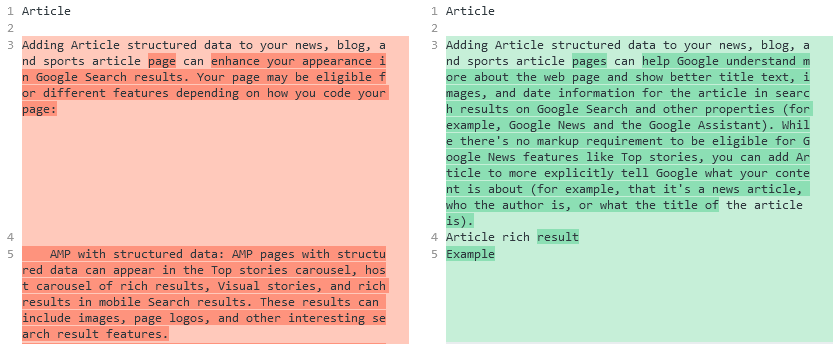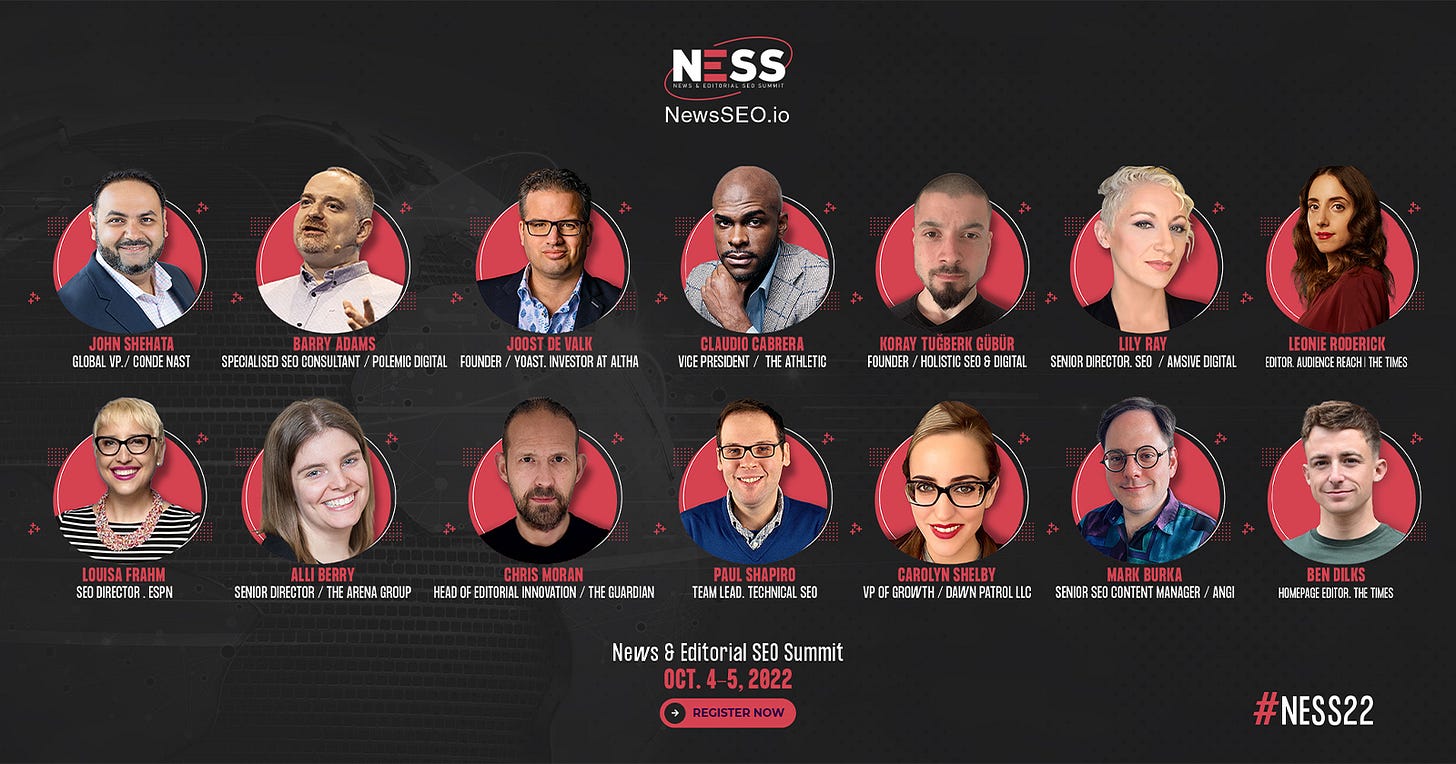The Latest Developments in News SEO
Instead of the usual single-topic exploration, this SfGN edition is a roundup of recent developments and interesting content.
I had intended to write a detailed guide to article tags and topic pages, as a companion piece to my internal links newsletter. However, there have been so many changes and developments in SEO that are especially pertinent to news publishers that it warrants summarising in a newsletter edition.
So let’s dig into what has happened recently in #NewsSEO.
Google Updates Galore
You’ll likely know that there was a recent Google core algorithm update. In fact, there have been multiple updates in succession. Some even overlapped in their rollouts.
2022 has been a busy year for major Google updates. We had the page experience for desktop update in February, followed by a product reviews update in March.
May saw a broad core algorithm update roll out, and we didn’t have to wait long until there was another product review update in July.
In August things heated up even more. First the pre-announced Helpful Content Update was rolled out, starting on August 25 with an apparent completion on September 9.
We barely had time to take stock, as on September 12 Google started rolling out another broad core algorithm update. Eight days later, on September 20, Google announced it had started the rollout of yet another product reviews update.
As of the writing of this newsletter, both of these recent Google updates are still in the process of being implemented and have not been officially ‘completed’ yet.

(Update: In typical fashion, less than a day after I sent this newsletter both updates are now reported to have completed rolling out.)
The impacts of some of these updates have been fairly mild, with few websites seeing any significant changes in rankings and traffic.
The hyped Helpful Content Update, initially seen as a potential armageddon for websites with low quality content, barely caused any ripples.
However, the latest core algorithm update and/or the overlapping product review update are definitely causing ripples.
Data from Sistrix shows many websites suffering painful losses of visibility in Google. In the UK, some news websites have been hit especially badly.
Take metro.co.uk for example. For a long time, this popular UK news site escaped Google’s wrath and kept a steady level of visibility. However, it saw a significant drop in visibility starting on 15 September, which turned into a catastrophic downfall on 20 September.
It could have been hit by the core algo update starting on the 12th, to then subsequently be hit by the product review update on the 20th. Or it could just have been the staggered rollout of the core update on its own. Impossible to say.
It is not the only major news publisher affected negatively in recent weeks - though it is, by far, suffering the worst losses.
Speculating on the hows and whys of their losses is easy, but that is all it’ll ever be; speculation. Especially due to the overlapping rollouts of two major algorithm updates.
I’ve written about Google’s algorithm updates before, and tried to explain their inherent inscrutability.
Google’s reliance on complex machine learning (ML) systems to drive rankings means that no one really understands how search results pages are ranked. The machines generate rankings, and we have little to no insight into what these ML systems are looking for.
What we have are the guidelines Google gives to its army of human search quality raters. These people, employed through 3rd party outsourcers, are tasked with evaluating Google’s search results and submitting feedback about the quality of ranked webpages.
We know that Google uses this feedback to improve the ML systems’ outcomes. It’s a form of human oversight on the increasingly opaque machine-driven rankings.
Whether or not this form of human oversight is effective, well, that depends on who you ask. The people behind the winning websites are big fans, the people behind the losing sites less so.
Factors like ‘quality’ and ‘authority’ are inherently subjective, and what one rater might determine to be a trustworthy website may be classified as low quality by another.
Google probably reckons that the subjectivity and prejudice that an individual quality rater injects into their feedback (consciously or otherwise) is balanced out by the large number of quality raters that they use.
That may be a correct assumption, but it should face scrutiny. After all, Google’s algorithm updates are not just technical novelties. They have a real impact on the business affected, and thus on people’s livelihoods.
If you want to keep on top of Google algorithm updates and their impact, these folks are worth following: Glenn Gabe, Lily Ray, and Marie Haynes.
Article Structured Data
It’s no secret that I have strong opinions on Google’s Accelerated Mobile Pages framework that they attempted to force onto the web - and especially onto news publishers - for the better part of half a decade.
It seems that Google is finally giving up on the controversial project. First, the requirements for AMP to appear in mobile Top Stories boxes was dropped, which caused a surge in non-AMP articles ranking on mobile results.
Since then, things had gotten quiet in AMP land, until Google updated its official documentation on Article structured data last month.
Before this update, the Article SD documentation had detailed sections on implementing structured data for AMP articles. There were different required and recommended attributes for structured data for AMP and for regular articles.
After this update, all mention of AMP has been removed.
If you’re interested (like me) in picking apart every change in the documentation, I’ve done a comparison between the old and current version which you can see on diffchecker.com here.
For me, the removal of any mention of AMP from this documentation is a milestone. It symbolises the moment Google has let go of its pet project, and sees no future for AMP articles in its ecosystem anymore.
I, for one, am positively gloating.
News and Editorial SEO Summit 2022
We’re just over a week away from the second News and Editorial SEO Summit, on 04 & 05 October, and personally I cannot wait.
Somehow John and I managed to put together another truly epic speaker roster, with a mouthwatering collection of talks to be delivered across the online event’s two days:
Claudio E. Cabrera, The Athletic: Live Journalism, SEO Strategies & Tactics.
Leonie Roderick & Ben Dilks, The Times: What do Paywalls mean for SEO?
Mark Burka, Angi: Commerce & Affiliate SEO for Publishers.
Carolyn Shelby, CSHEL: Using Automated Articles Successfully.
Alli Berry, TheStreet: Content Workflows for SERP Domination.
Koray Tuğberk GÜBÜR, Holistic SEO & Digital: How Search Engines Leverage Opinion-based Articles for Ranking.
We’ll also have two panel sessions, one on each day:
Day 1, Ask The SEOs: Ask this panel of experts, Claudio E. Cabrera, Carolyn Shelby, Koray GÜBÜR, Barry Adams, and John Shehata, any questions about your website’s SEO.
Day 2, Career Growth: Hear from Lily Ray, Chris Moran, Paul Shapiro, Louisa Frahm, Barry Adams, and John Shehata, as they talk about their career paths in SEO and news publishing.
Plus John and myself will give a talk each:
John Shehata, Condé Nast, NESS & NewzDash Founder: Top Stories State of the Union.
Barry Adams, Polemic Digital & NESS Founder: The Latest in Technical SEO for News Websites.
The event will once again be fully online and fully live, with plenty of opportunities for attendees to ask questions to our awesome speakers and panelists.
If you haven’t yet grabbed your ticket to NESS 22, go to newsseo.io now! Your ticket also gives you full access to the video recordings of all the talks and sessions.
New Google Search Console Reports
Whoever the Googlers in charge of Search Console are, they’re definitely earning their keep. There have been no fewer than three new and updated reports in Search Console recently.
First the Product Snippet report has been moved to a new category in GSC called Shopping, and supports a broader range of content.
The Merchant Listings report is entirely new, joining the Product Snippet report in the Shopping category, and shows information about webpages with Product structured data that are eligible to appear in the Merchant listings on Google results.
Yes, you read that correctly. You no longer need a separate feed to supply your products to Google’s Merchant Center for inclusion in their SERPs.
Webpages on your site with proper Product structured data are now eligible for product snippets on Google’s SERPs without needing a Merchant Center account and feed.
While primarily interesting for ecommerce sites, I know many publishers that have ecommerce sections and/or publish product reviews on their site. These enhanced reports and expanded eligibility will make things a bit easier for them.
There’s also a new HTTPS report that shows which of your URLs aren’t served over HTTPS. As HTTPS is part of the Page Experience ranking factor, it’s good to know where your site falls short of these requirements.
The Core Web Vitals report has been improved, with more URL-level data to help you troubleshoot your performance issues.
It’s not all good news. The very useful International Targeting report, which reported hreflang issues and enabled us to set geotargets for gTLDs and verified subfolders, has now been retired.
There’s no replacement for this report, which means websites with international sections or equivalents will find it that much harder to get their geotargeting signals right.
Google giveth, and Google taketh away.
Miscellanea
Some more recent bits and pieces that you may find interesting:
European and British publishers are suing Google for €25bn for alleged abuse of their adtech monopoly.
Have trouble getting SEO implemented by your dev team? Adam Gent’s latest newsletter on SEO & Engineering Principles is a must-read.
Tribune turned off AMP, and guess what happened? Exactly.
The White House intends to hold tech giants more accountable, and has outlined six key principles for accountability.
That’s it for this edition. With #NESS22 coming up, followed by a long overdue holiday, it may be a while before the next one hits your inboxes. I’ll do my best to make it worth the wait!
As always, thanks for reading and subscribing. I appreciate your comments and feedback, so don’t hesitate to leave me a note.









That article about the Tribune was pretty damn interesting Barry!